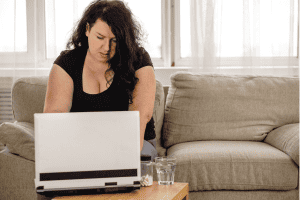“My fertility struggles left me with a sense of failure” – When Becoming Pregnant isn’t Easy
Struggling with fertility issues and undergoing IVF treatments are some of the most emotionally challenging experiences a person can face. As someone who has walked this path myself, I understand firsthand the rollercoaster of emotions, the sense of isolation, and the feelings of failure and disappointment that can accompany this time in life.
Perhaps you’re in this place at the moment – searching for spaces to articulate your experience, to know you’re not alone, and to feel connected again.
In this post, we’ll explore some common themes of IVF and fertility struggles, and offer guidance for navigating through these experiences.
Fertility struggles and IVF are emotional and psychological journeys as much as they are physical ones
And, they can impact us in a number of ways:
1. Feeling stressed, depressed and anxious
Given the range of challenges involved, it’s not surprising that people going through IVF and challenges with conceiving often experience higher rates of stress, depression and/or anxiety.
The anticipation, preparations and disappointments often brings many different emotions, such as:
- Anger
- Sadness
- Guilt
- Hopelessness
- Despair
- Grief
The effects of infertility can also lead to relationship and financial issues, stress, social isolation and self-criticism, which further adds to the pressures our brains, bodies and hearts are under.
2. Experiencing a sense of failure
We live in a very family-oriented society, with many internal and external pressures placed around having children. And sometimes, we can hold an internalised belief that self-worth is tied to the ability to become pregnant.
What I commonly hear in my role as a perinatal counsellor is that clients who have been through fertility challenges or an unsuccessful round of IVF describe feeling a sense of failure. They describe feeling in some way that these challenges are their fault, or they have failed somewhere along the way.
Here’s the truth though: your struggles with fertility and IVF are not a personal failing in any way. Part of you may know that, but part of you thinks and feels very different.
Yet, the emotional fall-out is still very real and can feel immense – taking a toll on our self-esteem and self-confidence.
3. Facing relationship challenges
Going through IVF, or facing challenges with conceiving can have an impact on the relationships we have with friends, family and partners.
The journey with infertility and with IVF are very personal, and many choose to keep their struggles private, to avoid possible judgement or pressures from others.
It can be an isolating time, and this can lead to distance and misunderstandings with those in our lives.
Getting support
If you’re experiencing strong emotions of grief, anger, hopelessness…or you’re feeling isolated from your community, please know that you don’t have to hold this all by yourself. There are experienced counsellors, therapists and practitioners out there, who understand the challenges and emotions of fertility struggles, and who are trained to support people throughout their journey.
Here’s my best tips for supporting your wellbeing through IVF and fertility struggles
1. Seek professional support from an experienced counsellor or therapist
If you’ve noticed that your mental health is under pressure, I encourage you to take that first step and reach out to a perinatal counsellor who understands IVF and fertility challenges. They can provide you with a safe and supportive space to process your experiences, as well as providing tools and techniques to support your mental health.
2. Practice self compassion
There is no right or wrong way to feel when you’re going through this process. Finding ways to bring compassion to yourself can ease some of the pain that comes when we blame ourselves or feel we’ve failed ourselves or others. Remind yourself that the outcome of this journey isn’t anyone’s fault. You are doing everything that’s within your power, and nurturing yourself along the way will support your wellbeing.
3. Build supportive relationships
We know that having supportive relationships is important for our wellbeing, and this is just as true during IVF or fertility challenges. Having the right people to lean on and confide in is important – those who can take your lead on what you need (whether that’s advice, a listening ear, or practical support). And, of course, it’s healthy and completely okay to set boundaries around who you share with and what you share.
I know it feels like these feelings and challenges are insurmountable right now. I want to remind you that you don’t have to face them alone – there are people out there who understand what you’re going through and who want to help.
While it took me a long time to find someone to support me who actually understood, the decision to seek support was the catalyst for change and transformation in my life.
As I moved toward healing, I realised I wasn’t alone. So many mothers face similar challenges, feeling disconnected from themselves and those around them.
I knew that if I could find my way back to wholeness, I could help others to do the same.
That’s why I became a therapist – to create a space where other parents can find connection, understanding and trauma-informed support.
I developed my RISE framework to guide women through birth and perinatal trauma recovery, supporting them in finding healing. And within this framework my practice has now supported hundreds of women to do just that.
If my story resonates with you, I want you to know there is healing and connection waiting for you too.
If you’d like support through your journey – reach out. I’d love to connect with you and support you.















